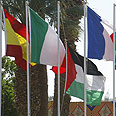


European and conservative Arab leaders gathered in Sharm el-Sheikh on Sunday to back Egyptian efforts to turn a shaky ceasefire in Gaza into a solid mutual agreement leading to Israeli withdrawal.
The leaders of Britain, the Czech Republic, Egypt, France, Germany, Jordan, Spain and Turkey, along with UN Secretary-General Ban Ki-moon, are meeting in the resort of Sharm el-Sheikh to coordinate policy on the Israeli-Palestinian conflict after three weeks of fighting in and around Gaza.
Palestinian President Mahmoud Abbas and Arab League Secretary-General Amr Moussa will also attend, officials said.
Israel announced a unilateral ceasefire overnight and the Islamist movement Hamas responded on Sunday by declaring a one-week truce for Israeli troops to leave the coastal strip.
But attacks on Sunday showed that the truce was fragile, with the two sides in disagreement over what should happen next.
"There are some violations here or there. The aim now is to consolidate that ceasefire so that a ceasefire with a longer duration can be achieved," Egyptian Foreign Ministry spokesman Hossam Zaki told the Arabic satellite channel Al Arabiya.
The Palestinian ambassador to Egypt, Nabil Amr, said the most pressing issue now was the withdrawal of Israeli troops and Israel should come under pressure to pull them out at once.
European diplomats said that their heads of government would offer political support for Egyptian efforts to mediate an agreement between Israel and Hamas.
Israel's decision to abandon attempts to reach a mediated truce with Hamas was a blow to Egyptian diplomacy but President Hosni Mubarak said on Saturday that Egypt would keep trying.
Zaki said the leaders wanted to discuss how to help make sure there is no repeat of the Gaza conflict, in which Israeli forces killed 1,200 Palestinians. Ten Israeli soldiers and three civilians hit by rockets were killed.
"The leaders want to discuss how to help in preventing this tragedy from being repeated, and how to all work on ... rebuilding Gaza," he said.
Brown: End Gaza's economic isolation
Several of the participants, including Britain, France and Germany, have offered to send warships to the Middle East to help prevent Hamas in Gaza from receiving arms shipments.One diplomat said this in itself was a departure in policy for the Europeans, who have previously refrained from using their armed forces to help either side.
British Prime Minister Gordon Brown told reporters on his way to Sharm el-Sheikh the British navy would patrol the Red Sea and the Gulf of Aden to prevent arms smuggling.
An end to the smuggling has been one of the Israeli demands in the conflict, which began on December 27 after a six-month truce between the two sides broke down.
But Egypt, much criticized in the Arab world for cooperating in the Israeli blockade of Gaza over the past six months, has refused to allow foreign forces onto its territory as part of the anti-smuggling effort.
Brown said, "Our first priority - a humanitarian imperative - is to get food and medical treatment to those who so urgently need it... Israel must allow full access to humanitarian workers and to relief supplies. We must also end Gaza's economic isolation by reopening the crossings."















